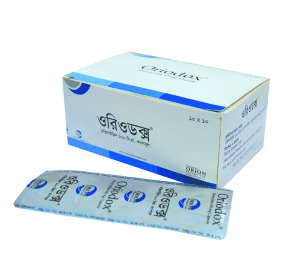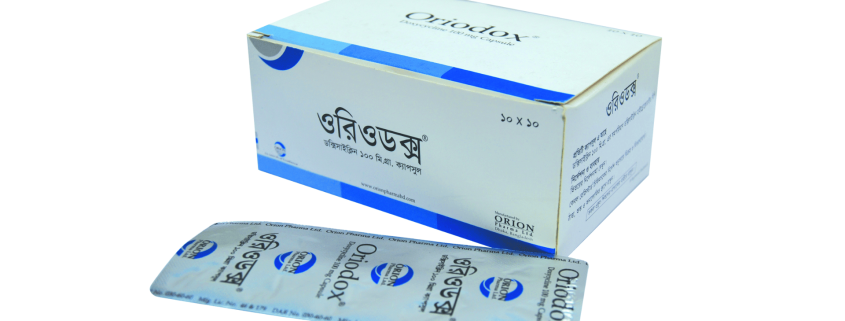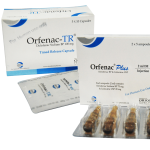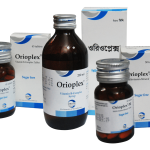Oriodox

ANTIBIOTICS: Doxycycline HCl
Indication
Oriodox has a very wide spectrum of activities and has been used in the treatmentof a large number of infections caused by susceptible organisms.
Respiratory tract infections: Pneumoniae, influenzae, pharyngitis, tonsillitis,bronchitis, sinusitis, otitis media and other streptococcal and staphylococcalinfections where tetracycline resistance is not a problem.
Genitourinary tract infections: Pyelonephritis, cystitis, urethritis, gonorrhea,eqididymitis, syphilis, chancroid and granuloma inguinal,Chlamydia: Lymphogranuloma venereum, psittacosis, trachoma.
Intestinal diseases: Whipples, disease, tropical sprue, blind loop syndrome. Inacute intestinal amoebiasis Oriodox may be a useful adjunct to amoebicides.
Bacillary infections: Brucellosis, tularemia, cholera, traveller\\\’s diarrhea.
Acne : Acne vulgaris, acne conglobata and other forms of acne.
Other infections : Actinomycosis, leptospirosis, typhus, rickettsial pox and Qfever,Celiulitis furunculosis, abscess and infections caused by Mycobacteriummarinum, Bordetella pertussis and Bacillus anthracis.
Contraindication
Hypersensitivity to any of the tetracyclines contraindicates the use of doxycycline.WarningThe use of drugs of tetracycline group during tooth development (last half ofpregnancy, infancy and childhood to the age of 8 years) may cause permanentdiscoloration of the teeth. Tetracyclines, therefore, should not be used in the agegroup unless other drugs are not likely to be effective or are contraindicated.CautionConcomitant intake of alkalis, antacids and iron may interfere with the absorptionof doxycycline.Doxycycline has been shown to depress plasma prothrombin activity hencepatients on anticoagulant therapy may require adjustment of their anticoagulantdosage. It is advisable to avoid doxycycline in conjunction with penicillin.Doxycycline should not be used in pregnant women unless in the judgment of thephysician, it is essential for the welfare to the patient.
Dosage & Administration
Adults: Two capsules at a time or one capsule every 12 hours for the first dayfollowed by one capsule per day. The dosage may be doubled depending onseverity of the infection.
Gonococcal Infections: One capsule every 12 hours until complete recovery.Syphilis: 3 capsules in divided doses for 10 days.Oriodox may be taken any time of the day and in case of gastric irritation may betaken with food or milk
Side Effect
Doxycycline may produce gastrointestinal irritation to a varying degree in somebut all individuals, Epigastric distress, abdominal discomfort, nausea andvomiting may occur. Long term therapy with Doxycycline may produce changesin the peripheral blood. Various skin reactions including rashes, urticaria,exfoliative dermtitis may follow the use of Doxycycline but they are rare.
Precaution
The use of drugs of the tetracycline class during tooth development (last half of pregnancy, infancy and childhood to the age of 8 years) may cause permanent discoloration of the teeth (yellow-gray-brown).
Clostridium difficile-associated diarrhea: Evaluate patients if diarrhea occurs. Photosensitivity manifested by an exaggerated sunburn reaction has been observed in some individuals taking tetracyclines. Limit sun exposure. Overgrowth of non-susceptible organisms, including fungi, may occur. Reevaluate therapy if super infection occurs.
Drug Interaction
Patients who are on anticoagulant therapy may require downward adjustment of their anticoagulant dosage. Avoid administration of tetracycline’s with penicillin. Absorption of tetracycline’s is impaired by antacids containing aluminum, calcium, or magnesium, bismuth subsalicylate and iron-containing preparations. Concurrent use of tetracycline may render oral contraceptives less effective. Barbiturates, carbamazepine and phenytoin decrease the half-life of doxycycline
Presentation
Oriodox capsule : Each box containing 10 x 10\\\’s capsules in blister pack.



